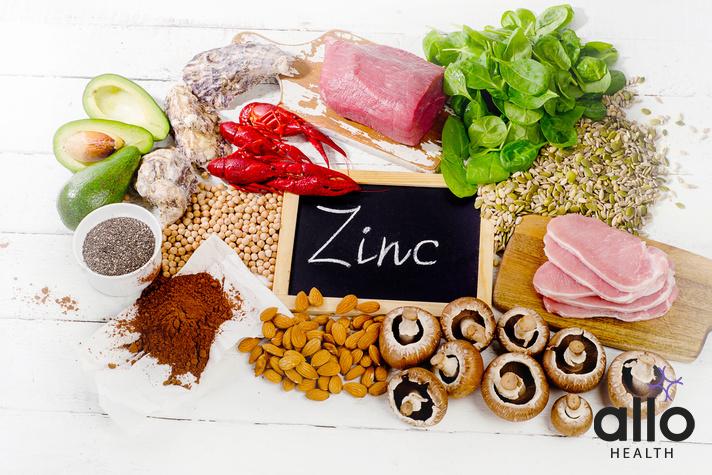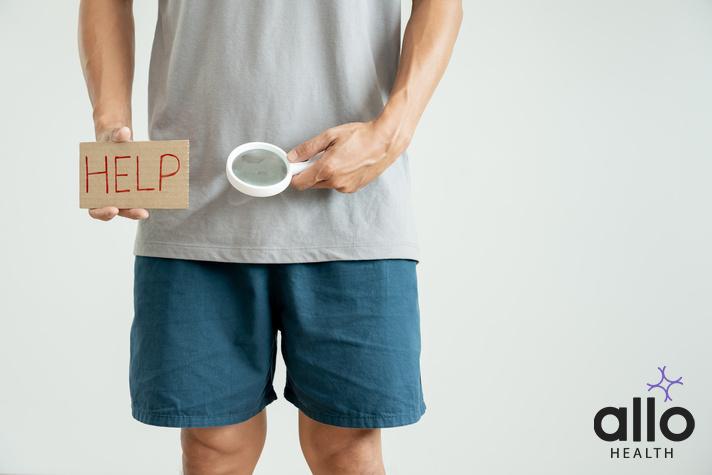Zinc for Erectile Dysfunction: Its Role and Benefits

Allo Health is dedicated to personalized well-being, offering support and trusted information tailored to individual health goals. The platform emphasizes human-generated content, led by a distinguished medical team of experts, including physicians and sexual health specialists. Their commitment to credibility involves rigorous fact-checking, authoritative research, and continuous updates to ensure accurate, up-to-date information. Allo Health's unique approach goes beyond conventional platforms, providing expert-led insights and a continuous commitment to excellence, with user feedback playing a crucial role in shaping the platform's authoritative voice.

Dr Sanina Mansoor holds MBBS degree from Yenepoya university,Mangalore.She has 8 years of experience working as a medical officer at various health centres and medical colleges.
Why This Was Upated?
Our experts continually monitor the health and wellness space, and we update our articles when new information became available.
Updated on 11 June, 2024
- Article was updated as part of our commitment to diversity, equity, and inclusion.

"The following blog article discusses food and diet-related information for general educational purposes. However, it is important to note that the information provided is not intended as personalized dietary advice and should not be considered a substitute for professional guidance from a registered dietitian or qualified healthcare professional. Before making any significant changes to your diet or nutrition plan, it is recommended to consult with a registered dietitian or healthcare professional.
Book consultation
Dietary changes can have a significant impact on your overall health and well-being. It is important to approach any changes to your diet in a balanced and sustainable manner, ensuring that you meet your nutritional needs and avoid any potential nutrient deficiencies. Rapid or extreme changes in dietary patterns can be detrimental to your health and may require professional guidance.
It is crucial to note that any specific dietary recommendations or guidelines mentioned in this article may not be appropriate for individuals with specific medical conditions, allergies, or intolerances. A registered dietitian or healthcare professional can provide individualized advice, including modifications or alternative food choices to accommodate your unique circumstances.
The information provided in this article may not encompass all possible dietary considerations or account for the latest research and nutritional guidelines."
Erectile dysfunction (ED) is a common concern affecting men’s sexual health. Recent studies suggest a significant link between zinc levels and sexual function. This article explores how zinc, an essential mineral, plays a vital role in maintaining sexual health and treating ED.
Role of Zinc in Sexual Health
Zinc, an essential mineral, plays a vital role in various aspects of sexual health, impacting everything from hormone levels to sperm production. Here’s a breakdown of its key functions:
- Maintain Healthy Testosterone Levels: Zinc is crucial for the production of testosterone, a key sex hormone. Adequate levels of zinc can help maintain healthy testosterone levels, essential for sexual desire and sexual competency.
- Improve Sperm Count and Quality: Zinc is a key component in sperm production and is found in high concentrations in the prostate glands. Deficiency in zinc can lead to a reduced sperm count and affect sperm motility, which are critical factors in male fertility.
- Maintain Prostatic Health: Zinc plays a significant role in the health of the prostate glands. It’s a vital mineral in the makeup of prostatic fluid, essential for the nourishment and transportation of sperm.
- Erectile Dysfunction Treatment: Zinc deficiency has been linked to erectile dysfunction (ED). Supplementing zinc can potentially be an effective treatment for ED, especially in those with a diagnosed deficiency.
- Maintain Cardiovascular Health: Zinc contributes to overall cardiovascular health by aiding in the maintenance of blood vessels. Healthy blood circulation is crucial for achieving and maintaining erections.
- Helps in Immune Function and Hormone Level Regulation: Zinc is important for immune function and the regulation of hormone levels. This includes hormones that influence sexual function and general well-being.
- Impact on Mental Health Concerns: Zinc’s role in mental health can indirectly affect sexual health. Mental health concerns like stress and anxiety can impair sexual function, and maintaining adequate zinc levels can help in managing these concerns.
Zinc plays a multifaceted role in sexual health, influencing everything from hormone production and erectile function to sperm count and overall well-being. Maintaining adequate zinc levels, whether through diet or supplementation, is key to preserving sexual health and addressing concerns like erectile dysfunction.
How Zinc Deficiency Affect Erectile Dysfunction?
Zinc deficiency can significantly impact erectile dysfunction (ED) in several ways:
- Decrease in Testosterone Levels: Zinc plays a vital role in the production and regulation of testosterone, a key sex hormone. Low levels of zinc can lead to a decrease in testosterone, which is crucial for sexual desire and the ability to maintain an erection.
- Low Nitric Oxide Production: Zinc is involved in the production of nitric oxide, a molecule that helps relax penile blood vessels. This relaxation is necessary for the blood flow required to achieve and maintain an erection. A deficiency in zinc can hinder this process, leading to difficulties with erections.
- Hormonal Imbalance: Zinc contributes to the balance of hormones in the body, not just testosterone. Imbalances caused by insufficient zinc can affect sexual function and libido.
- Affect Nerve Function: Zinc is important for nerve health and function. Proper nerve function is crucial for the sexual arousal process, and a deficiency can impair the signals between the brain and the genital area.
- Affect Mood and Mental Health: Zinc deficiency can impact mood and mental health, which are important for sexual desire and performance. Issues like depression and anxiety, which can be exacerbated by low zinc levels, often play a role in ED.
- Poor Immune System Function: Since zinc is essential for a healthy immune system, a deficiency can lead to overall poor health, which can indirectly affect sexual performance and erectile function.
- Impair Cellular Health: Zinc is vital for cell growth and repair, including those in reproductive organs and tissues. A deficiency can impair the health of these cells, affecting sexual function.
Zinc deficiency can affect erectile dysfunction through hormonal imbalances, reduced blood vessel relaxation, impaired nerve function, mental health impacts, weakened immune system, and poor cellular health in reproductive tissues. Addressing zinc deficiency is therefore an important aspect of managing and treating ED.
Incorporating Zinc Into Your Regimen

Incorporating zinc to treat erectile dysfunction involves a multi-faceted approach that includes understanding zinc’s vital role in sexual health, ensuring adequate dietary zinc intake, and considering zinc supplementation under medical guidance.
Identifying Zinc Deficiency
- Recognizing signs of zinc deficiency is crucial. Symptoms may include reduced sexual desire, lower sperm count, and hormonal imbalances.
- Risk factors for zinc deficiency include a low-zinc diet, certain gastrointestinal diseases, and the use of prescription medications that affect zinc absorption.
Zinc Supplementation
- Zinc supplements, such as zinc gluconate or zinc sulfate, can help restore optimal levels of zinc, especially for those with a diagnosed deficiency.
- The recommended intake of zinc per day varies, but generally, 8-11 mg is advised. Consult a healthcare professional to determine the appropriate dosage.
Dietary Modifications
- Incorporating zinc-rich foods into your daily diet is a natural way to boost zinc levels. This includes oysters, red meat, poultry, beans, and nuts.
- A balanced diet, possibly high in protein, can support overall sexual health and ensure adequate intake of essential nutrients.
Consulting Healthcare Professionals
- Before starting any zinc treatment or supplementation, it’s crucial to consult with healthcare professionals. They can provide guidance on effective treatments and ensure that the supplementation does not interfere with existing medical conditions or medications.
Complementary Treatments
- Alongside zinc, other treatments for erectile dysfunction, such as medications, erection devices, lifestyle changes, physical exercises, and other natural supplements, may be recommended to enhance sexual performance.
- Addressing mental health concerns, cardiovascular health, and maintaining a healthy diet are also key aspects of treating erectile dysfunction effectively.
Note: Zinc is not a definite or universally effective treatment for erectile dysfunction (ED). The relationship between zinc and ED is complex and can vary greatly depending on the individual’s overall health, the cause of their ED, and their nutritional status.
Risks and Considerations

Treating erectile dysfunction (ED) with zinc involves several risks and considerations. While zinc plays a vital role in sexual health, it’s essential to understand its potential side effects and the importance of balanced supplementation.
Risks of Zinc Supplementation
- Excessive Zinc Intake: Overconsumption can lead to gastrointestinal concerns, headaches, and lethargy. It’s crucial to avoid exceeding recommended doses to prevent signs of zinc toxicity.
- Interference with Other Nutrients: High levels of zinc can interfere with the absorption of other essential minerals, like copper, leading to nutrient deficiencies.
- Adverse Effects on Medication: Zinc can interact with certain prescription medications, affecting their efficacy.
- Cardiovascular Health Concerns: Excessive zinc may impact heart disease risk factors, such as blood pressure.
Precautions for Zinc Supplements
- Medical Consultation: Before starting zinc treatment for ED, it’s essential to consult with a healthcare provider, especially if you have underlying health conditions like heart disease, gastrointestinal diseases, or mental health concerns.
- Monitoring Hormone Levels: Zinc affects hormone levels, particularly testosterone. Monitoring these levels is necessary to ensure they remain within a healthy range.
- Addressing Underlying Causes: Zinc supplementation should be part of a broader approach to treat ED. Factors like psychological concerns, blood vessel health, and overall physical health must also be considered.
Zinc and Other Health Conditions
- Patient with Prostate Concerns and Cancer: Excessive zinc intake has been linked to prostate gland concerns. Men with a history of prostate concerns should be cautious.
- Impact on Blood Vessels: Zinc affects blood vessel health, which is crucial for treating ED but can complicate pre-existing conditions.
Dietary Considerations
- Balanced Diet: A diet rich in zinc is generally safer and more effective than high-dose supplements. Foods like oysters, nuts, and beans provide zinc without the risk of excessive intake.
- Nutrient Deficiencies: A holistic approach to diet helps prevent nutritional deficiencies. A balanced diet contributes to overall sexual health and erectile function.
Effective Treatments and Overall Health
- Comprehensive Sexual Health Approach: Besides focusing on zinc intake, it’s important to consider other factors contributing to sexual performance, such as mental health, cardiovascular health, and lifestyle habits.
- Lifestyle Changes: Regular exercise, a healthy diet, and avoiding risk factors like smoking can significantly improve ED beyond zinc supplementation.
While zinc plays a crucial role in sexual function and may help treat ED, it’s important to approach zinc supplementation with caution. Balancing zinc intake, either through diet or supplements, should be done under medical guidance, especially considering individual health conditions and the potential side effects of excessive zinc.
Conclusion
Zinc plays a critical role in sexual function, and addressing zinc deficiency can be a key factor in treating erectile dysfunction. A combination of a healthy diet, appropriate supplementation, and medical treatment can provide effective solutions. Always consult a healthcare professional before starting any new supplement regimen.
Most Asked Questions
-
What role does zinc play in treating erectile dysfunction?
Zinc is a vital mineral that helps maintain healthy testosterone levels and supports sexual health. It can improve sexual desire, sperm count, and the overall ability to achieve and maintain an erection.
-
How can I tell if I’m deficient in zinc and need supplements?
Signs of zinc deficiency include decreased sexual desire, lower sperm count, and weakened immune function. If you notice these symptoms, it’s a good idea to consult a healthcare professional to check your zinc levels.
-
Are there any risks associated with taking zinc supplements for erectile dysfunction?
While zinc supplements can be beneficial, excessive intake can lead to gastrointestinal problems and affect the absorption of other minerals. It’s important to follow recommended dosages and consult with a healthcare provider.
-
Can I improve my zinc levels through diet alone?
Yes, consuming zinc-rich foods like oysters, red meat, poultry, beans, and nuts can naturally boost your zinc levels. A balanced diet, rich in essential nutrients, is a key factor in maintaining good sexual health and function.






































